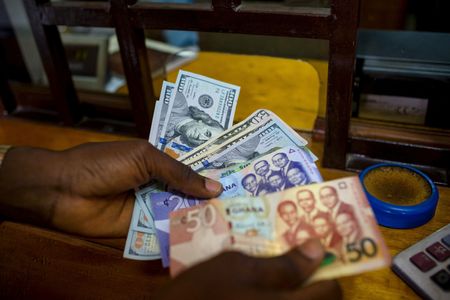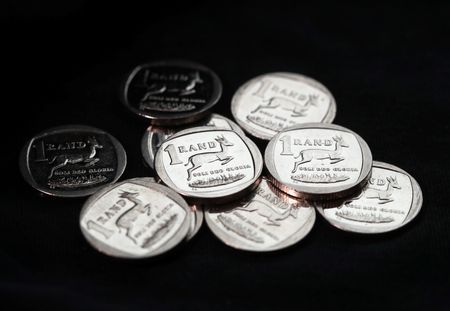(Adds reporting credit)
NAIROBI (Reuters) -Ghana’s cedi is expected to weaken against the dollar in the next week to Thursday, while the currencies of Kenya, Nigeria, Uganda and Zambia are expected to be broadly unchanged, traders said.
KENYA
Kenya’s shilling is expected to be steady against the dollar over the next week.
Commercial banks quoted the shilling at 129.00/40 per dollar, compared with last Thursday’s close of 129.25/65.
“For the next week, (it will be) stable, no change,” said a trader at one commercial bank.
NIGERIA
Nigeria’s naira is also expected to remain range-bound, with the central bank and exchange bureaus selling dollars to meet demand from importers and travellers.
The naira was quoted around 1,533 to the dollar on the official market on Thursday, compared with last week’s close of 1,534. It traded at about 1,540 on the street.
“With inflation easing, speculative trading has been limited, causing the naira to trade in a tight range around 1,530,” one trader said. “The naira is likely to stay in a narrow band between 1,520 and 1,560 next week.”
GHANA
Ghana’s cedi is expected to slip further on the back of strong corporate demand amid limited supply and a lack of continuous central bank liquidity support.
LSEG data showed the cedi trading at 10.90 to the dollar on Thursday compared to 10.70 at last Thursday’s close.
“FX demand from local corporate accounts remains firm, particularly from the manufacturing, commerce and services sectors,” one trader said.
“We expect the cedi to slide further against the dollar in the coming week on account of this. Bids submitted at the intermittent central bank auctions are far outpacing the allocated amounts,” the trader added.
Chris Nettey, head of trading at Stanbic Bank Ghana, said he expected further weakness to persist until demand and supply reach equilibrium, something that could be supported by ongoing central bank reforms and an increase in intervention volumes.
Meanwhile, the Bank of Ghana has instructed all banks to stop paying out foreign currency (FCY) to large corporates unless the transactions are fully backed by equivalent FCY cash deposits from the same institutions.
It said FCY withdrawals by large corporates, including bulk oil distributors and mining firms, which are not directly funded by prior deposits, were putting pressure on the cedi and hampering efforts to ensure stability.
UGANDA
The Ugandan shilling is expected to trade in a stable range in the coming week, supported by subdued demand for dollars from merchandise importers following a traders’ strike. Commercial banks quoted the shilling at 3,560/3,570 against the dollar at 1002 GMT on Thursday. This compares to last Thursday’s close of 3,553/3,563. “We expect dollar appetite from merchandise importers to remain slow as activity slowly recovers from the strike,” said an independent foreign exchange trader.
Merchandise retailers in Uganda’s capital, Kampala, and other areas staged a two-day strike this week, protesting against high taxes and what they describe as a “Chinese invasion” of their commercial activity.
ZAMBIA
Zambia’s kwacha is likely to hold steady against the dollar next week, though rising demand for hard currency could exert mild downward pressure on the currency. On Thursday, the kwacha was quoted at 23.53 per dollar from 23.36 a week ago.
“We expect the kwacha to trade within range, but could post some minor losses due to corporate greenback appetite,” Zambia National Commercial Bank said in a note.
(Reporting by George Obulutsa, Chris Mfula, Elisa Biryabarema, and Christian Akorlie; Editing by Elisha Bala-Gbogbo)










